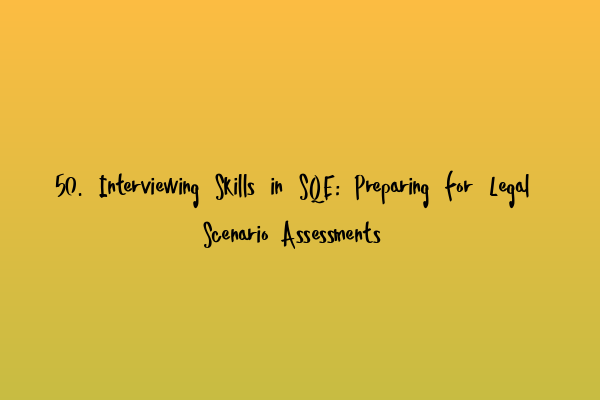Interviewing skills are a crucial component of the SQE exams. As a future legal professional, it is essential to master the art of interviewing to succeed in the legal scenario assessments. In this blog post, we will provide you with valuable insights and tips on how to prepare for the legal scenario assessments and excel in your interviews.
1. Understand the Assessment Format
Before diving into preparations, it is essential to understand the format of the legal scenario assessments. Familiarize yourself with the types of questions that may be asked and the specific skills being evaluated. This will allow you to tailor your preparation accordingly and focus on the areas that need improvement. For a detailed understanding of legal scenario assessments, you can read our article on SQE Case Studies: Applying Knowledge in Real-Life Scenarios.
2. Research the Legal Scenario Topics
Researching the legal scenario topics is crucial to gain a comprehensive understanding of the subject matter. Make sure to cover key areas of law that are likely to be tested, such as contract law, criminal law, tort law, and more. Thorough research will not only help you answer interview questions confidently but also demonstrate your knowledge and expertise. To learn more about the SQE and its significance, you can check out our article on Solicitors Qualifying Examination (SQE): Your Gateway to Legal Practice.
3. Develop Strong Communication Skills
Effective communication skills are essential for successful interviews. Practice presenting complex legal concepts in a straightforward and concise manner. Work on your verbal and non-verbal communication skills, including voice modulation, body language, and eye contact. Clear and confident communication will leave a lasting impression on the assessors. For strategies on mastering time management during the SQE exams, you can read our article on Mastering Time Management in SQE: Strategies for Efficient Exam Completion.
4. Brush up on Legal Ethics
Legal ethics play a crucial role in the legal profession. Be well-versed in the Solicitors Regulation Authority (SRA) Code of Conduct and other relevant ethical guidelines. Familiarize yourself with common ethical dilemmas and practice applying ethical principles to hypothetical scenarios. Demonstrating a strong understanding of legal ethics will showcase your professionalism and integrity. For tips on analyzing mock results and identifying areas of improvement, you can refer to our article on Analyzing Mock Results for SQE: Identifying Areas of Improvement.
5. Practice Mock Scenarios
Practice makes perfect when it comes to legal scenario assessments. Engage in mock interviews with your peers or mentors to simulate the real exam environment. Work on your problem-solving skills, analytical thinking, and ability to apply legal principles to practical situations. Seek feedback and identify areas where you can improve. For strategies on tackling multiple-choice questions in SQE1, you can explore our article on Conquer the Multiple Choice Questions (MCQ) in SQE1.
6. Stay Updated with Current Legal Developments
Stay up-to-date with current legal developments and hot topics in the legal profession. Being aware of recent case law, legislative changes, and emerging trends will enhance your credibility during interviews. Subscribe to legal newsletters, attend webinars, and engage in discussions with fellow legal professionals to stay informed.
In conclusion, effective interviewing skills are crucial for success in the legal scenario assessments of the SQE exams. By understanding the assessment format, conducting extensive research, developing strong communication skills, brushing up on legal ethics, practicing mock scenarios, and staying updated with current legal developments, you will be well-prepared to excel in your interviews. Good luck!
